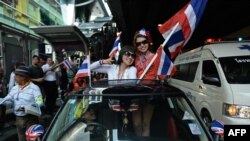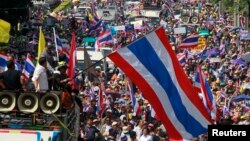BANGKOK —
Thailand's main opposition Democrat Party says it will boycott national elections in early February because it does not see how the vote can resolve the current political crisis. With more anti-government protests expected, analysts and Thai army leaders say the boycott announcement is an additional concern.
Opposition Democrat Party leader Abhisit Vejjajiva announced his party's withdrawal Saturday from the February 2 election. Prime Minister Yingluck Shinawatra had called for the vote in the hope of ending weeks of street protests against her government's policies and legislative agenda.
Yingluck, in a broadcast on national television, called on all parties to support a national reform council to be set up after the polls.
But Abhisit, a former prime minister, said the Democrat Party's decision was based on a growing loss of confidence in the government's ability to enact reforms. His deputy leader, Kiat Sittheeamorn, says party members feel an election alone will not resolve Thailand's present crisis.
"Basically we will not field any candidate for the election this time for February 2 and the reason being that at this point in time we do not believe that the election on the 2nd of February is going to answer to the people and also the crisis that we are facing," said Kiat.
The boycott by the Democrats, whose support base is in the southern provinces and central regions, follows a similar move in 2006 when Yingluck's older brother, Thaksin Shinawatra, then Prime Minister, called a snap election in response to street protests about corruption. The election was later annulled by the courts.
On Saturday, Yingluck set out a plan for a post-election national reform council, comprising representatives from political parties, professions and institutions, to recommend changes - especially political reforms - after the polls.
The current anti-government street protests, led by a former Democrat Party member of parliament, are calling for the government's suspension and formation of an independent reform council before fresh elections can be held. Protesters accuse the government of abusing its majority in the House, especially over a blanket amnesty bill that would have cleared Yingluck's brother of corruption charges arising from his time as government chief.
Analysts are divided over the timing of elections and the type of reforms that Thailand needs.
Titipol Phakdeewanich, a political scientist from the northeastern university of Ubon Ratchathani, says a boycott could damage the Democrat Party's reputation and hopes of gaining votes in the northern regions, a known stronghold of Yingluck's governing Pheu Thai Party.
"They must remember that Thailand is not just Bangkok and the south, and if they want to win they have to look out to the rest of the country - this is very important - [for] how to gain support, how to motivate people to vote for the party. It's very important," said Titipol. "When they are not taking part [voting], they destroy both the domestic and international reputation of the party in the long term."
Other analysts contend a snap election is unlikely to end to Thailand's present political conflict. They feel the government's present course could exacerbate tensions and further destabilize Thai politics.
Thai Army Chief General Prayuth Chan-ocha is reported to have warned there is a danger of civil conflict if the political crisis continues, and is proposing a people's assembly to heal the deep political rifts. Earlier, the army had said it would support the voters' decisions, if the vote is free and fair.
Thailand's Election Commission met with Yingluck Friday and said the vote could go ahead, providing political reconciliation takes place before February.
Opposition Democrat Party leader Abhisit Vejjajiva announced his party's withdrawal Saturday from the February 2 election. Prime Minister Yingluck Shinawatra had called for the vote in the hope of ending weeks of street protests against her government's policies and legislative agenda.
Yingluck, in a broadcast on national television, called on all parties to support a national reform council to be set up after the polls.
But Abhisit, a former prime minister, said the Democrat Party's decision was based on a growing loss of confidence in the government's ability to enact reforms. His deputy leader, Kiat Sittheeamorn, says party members feel an election alone will not resolve Thailand's present crisis.
"Basically we will not field any candidate for the election this time for February 2 and the reason being that at this point in time we do not believe that the election on the 2nd of February is going to answer to the people and also the crisis that we are facing," said Kiat.
The boycott by the Democrats, whose support base is in the southern provinces and central regions, follows a similar move in 2006 when Yingluck's older brother, Thaksin Shinawatra, then Prime Minister, called a snap election in response to street protests about corruption. The election was later annulled by the courts.
On Saturday, Yingluck set out a plan for a post-election national reform council, comprising representatives from political parties, professions and institutions, to recommend changes - especially political reforms - after the polls.
The current anti-government street protests, led by a former Democrat Party member of parliament, are calling for the government's suspension and formation of an independent reform council before fresh elections can be held. Protesters accuse the government of abusing its majority in the House, especially over a blanket amnesty bill that would have cleared Yingluck's brother of corruption charges arising from his time as government chief.
Analysts are divided over the timing of elections and the type of reforms that Thailand needs.
Titipol Phakdeewanich, a political scientist from the northeastern university of Ubon Ratchathani, says a boycott could damage the Democrat Party's reputation and hopes of gaining votes in the northern regions, a known stronghold of Yingluck's governing Pheu Thai Party.
"They must remember that Thailand is not just Bangkok and the south, and if they want to win they have to look out to the rest of the country - this is very important - [for] how to gain support, how to motivate people to vote for the party. It's very important," said Titipol. "When they are not taking part [voting], they destroy both the domestic and international reputation of the party in the long term."
Other analysts contend a snap election is unlikely to end to Thailand's present political conflict. They feel the government's present course could exacerbate tensions and further destabilize Thai politics.
Thai Army Chief General Prayuth Chan-ocha is reported to have warned there is a danger of civil conflict if the political crisis continues, and is proposing a people's assembly to heal the deep political rifts. Earlier, the army had said it would support the voters' decisions, if the vote is free and fair.
Thailand's Election Commission met with Yingluck Friday and said the vote could go ahead, providing political reconciliation takes place before February.





